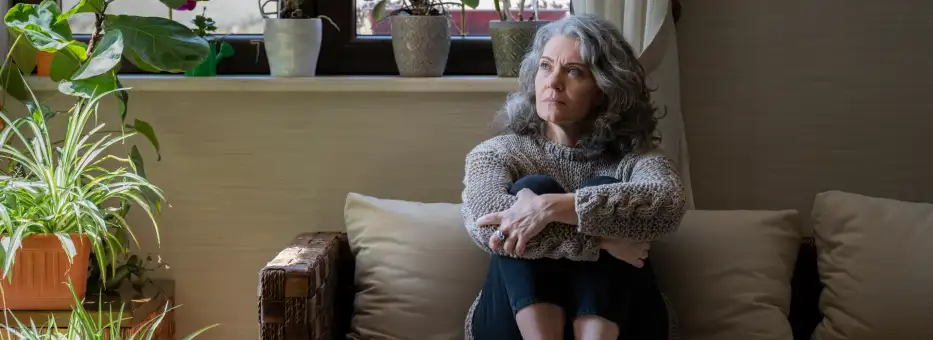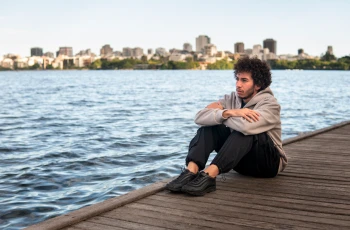How to deal with geriatric depression: Depression in older adults.
Written by Dr Nelson Lau, MBBS FRACGP, GP & Digital Health Specialist.

Contents

We often associate ageing with wisdom, retirement, and perhaps a slower pace of life. But what happens when the golden years are tarnished by persistent sadness and a loss of interest in life? Depression in older adults, also known as geriatric depression, is a serious issue, and it's something we need to talk about more openly.
What is depression in older people?
Depression isn't just a "normal" part of ageing. It's a genuine mental health condition that affects how you feel, think, and act. Imagine feeling a constant grey cloud hanging over you, draining your energy and joy. That's what depression can feel like, and it can affect anyone, regardless of age.Why is my mental health getting worse as I get older?
While ageing itself doesn't cause depression, the challenges that often accompany it can increase the risk. Retirement can bring a loss of purpose and social interaction, health problems can lead to pain and limitations, and the loss of loved ones can trigger intense grief. These experiences, while a natural part of life, can make individuals more vulnerable to depression.What causes geriatric depression?
Geriatric depression is often like a puzzle with multiple pieces. Alongside the life changes mentioned earlier, other factors can contribute, including:- Biological factors: As we age, our brains undergo changes that can affect mood regulation.
- Genetics: A family history of depression can increase one's risk.
- Medical conditions: Chronic illnesses like heart disease, cancer, or Parkinson's disease can contribute to depression.
- Medications: Some medications can have side effects that trigger or worsen depression.
Feeling sick and unsure why? Talk to a doctor online, available 24/7
Consult now
Available 24/7, across Australia.
Signs and symptoms of depression in older adults
Depression can manifest differently in older adults compared to younger people. While persistent sadness is a common symptom, it might not always be the most prominent one. Keep an eye out for these signs in yourself or your loved ones:- Changes in sleep patterns: Insomnia or excessive sleeping.
- Loss of interest in hobbies: No longer enjoying activities they once loved.
- Increased fatigue and lack of energy: Feeling drained all the time.
- Changes in appetite or weight: Significant weight loss or gain.
- Difficulty concentrating: Struggling to focus or make decisions.
- Feelings of worthlessness or guilt: Excessive self-blame or negativity.
- Unexplained physical aches and pains: Headaches, stomach aches, etc.
- Social withdrawal: Isolating themselves from friends and family.
- Thoughts of death or suicide: Expressing hopelessness or a desire to end their life.
How common is depression in older people?
Depression in later life is more common than you might think. It's estimated that around 1 in 5 older adults experience some form of depression. This highlights the importance of raising awareness and providing support.Medical conditions that can cause elderly depression
Certain medical conditions can mimic or contribute to depression. These include:- Thyroid disorders: An under-active thyroid (hypothyroidism) can cause symptoms similar to depression.
- Vitamin deficiencies: Deficiencies in vitamin B12 or folate can affect mood.
- Stroke: Depression can occur after a stroke, impacting recovery.
Is it depression or dementia?
Sometimes, the line between depression and dementia can seem blurry, as they share some overlapping symptoms, like memory problems and difficulty concentrating. However, there are key differences:- Depression: Cognitive difficulties are often related to low mood and improve with treatment.
- Dementia: Cognitive decline is progressive and affects daily functioning significantly.
Self-help for elderly depression
While professional help is often necessary, there are things older adults can do to help themselves:- Stay connected: Social interaction is vital for combating loneliness and isolation. Joining a club, volunteering, or simply spending time with loved ones can make a big difference.
- Find purpose: Engaging in meaningful activities can boost self-esteem and provide a sense of accomplishment. This could be anything from gardening to learning a new skill.
- Prioritise physical health: Regular exercise, a balanced diet, and sufficient sleep can significantly impact mood.
- Challenge negative thoughts: Learning to identify and challenge negative thought patterns can be empowering.
When to consult a doctor?
If you notice any signs of depression in yourself or a loved one, don't hesitate to seek professional help. Early intervention is crucial for effective treatment.Online support for elderly people
In today's digital age, there are numerous online resources available:- Lifeline (13 11 14): Provides advice from a trained crisis supporter on various issues affecting older adults.
- Hola Mental Health Care Plan: 100% bulk billed sessions with a trained GP. Connect within 15 minutes, anytime. Read more about Mental Heath plan.
- Opan (Older Persons Advocacy Network) 1800 700 600: A helpline offering confidential support and friendship.
How can I help an older person with depression?
If you know an older adult struggling with depression, here's how you can help:- Offer a listening ear: Sometimes, just having someone to talk to can make a world of difference.
- Encourage them to seek help: Offer to help them find a doctor or therapist.
- Spend quality time with them: Engage in activities they enjoy and offer companionship.
- Be patient and understanding: Recovery from depression takes time, so offer ongoing support.
Conclusion
Depression in older adults is a complex issue, but it's not insurmountable. By understanding the causes, recognising the symptoms, and seeking appropriate support, we can help older adults navigate this challenging condition and rediscover joy in their lives. Remember, it's never too late to seek help and improve your well-being. If you or someone you know is struggling, reach out. There is support available, and things can get better.Ready to access mental health support? Consult a GP to discuss your eligibility.
Book now
Fully bulk-billed, across Australia.
Providing consult for
- Cough
- Nausea & vomiting
- Fever
- Hayfever
- Fatigue
- Sore throat
- Acne
- Gout
- Eczema
- Rosacea
- Sunburn
- UTI
- Erectile dysfunction
- Contraception
- Morning sickness
- Morning after pill
- Prostate health
- Anxiety
- Depression
- Stress
- Grief & loss
- Premature ejaculation
- Asthma
- Blood pressure
- Diabetes
- Cholesterol
- Migraines & headaches
- Allergies
- Heartburn & reflux
- Sleep disorder
- Gastro
Related Articles
What Is Online Therapy? Everything You Need To Know About e-Therapy
February 19, 2026Mental Health
...
Disclaimer
This blog is for general informational purposes only and does not indicate that Hola Health provides all treatments or preventive measures mentioned. It is not intended to be a substitute for professional medical advice. Always seek the guidance of your doctor or other qualified health professional with any questions you may have regarding your health or a medical condition. For emergencies please immediately contact 000. Any medical topics discussed are intended to educate, not to imply availability through Hola Health.




